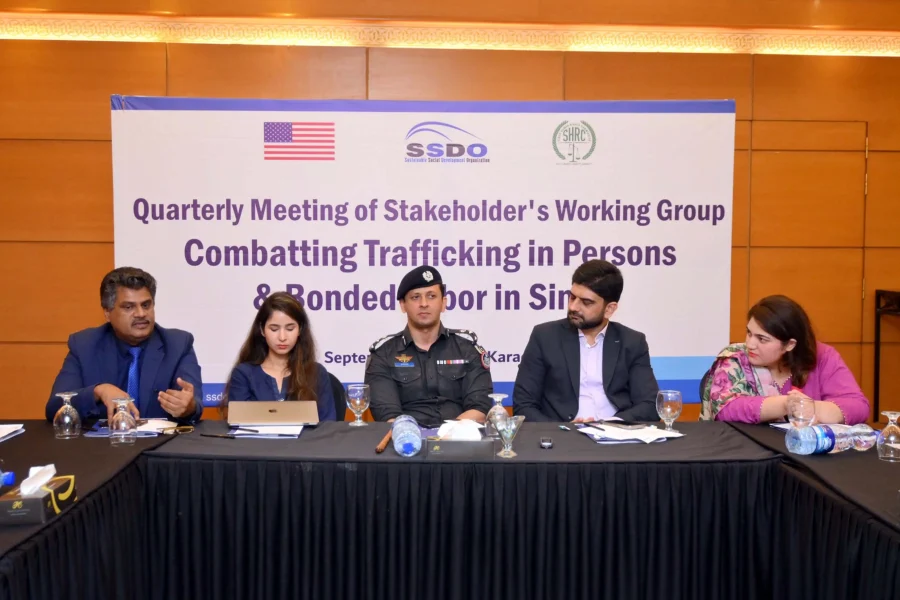The Sindh Human Rights Commission (SHRC), in partnership with the Sustainable Social Development Organization (SSDO), hosted a pivotal “Provincial Stakeholders’ Working Group Meeting of Sindh” on Wednesday. This collaboration aims to tackle the pressing issues of human trafficking and bonded labour across the province. The SHRC and SSDO are working closely with various governmental stakeholders to ensure justice, equity, and dignity for all citizens, making strides in these critical areas.
Iqbal Ahmed Detho, Chairperson of the SHRC, highlighted the need for Sindh to develop its own rules under the federal act, as the current Rules of Business apply only to the Islamabad Capital Territory (ICT). He revealed that draft rules are currently with the law department and accessible to the Home Department.
Detho also shared that he had personally visited all Dar-ul-Amans in Sindh, and that the SHRC and the Women Development Department (WDD) are collaborating to operationalize shelters in Jacobabad and Mirpurkhas. He pointed out the absence of a legal framework for these shelters and announced plans to draft legislation for their regulation. Furthermore, he called for the establishment of one-stop facilities in high-need cities outside Karachi and stressed the importance of improving the monitoring of inter-departmental coordination committees. Detho also noted the lack of a daycare center within the Secretariat. Syed Kausar Abbas, Executive Director of SSDO, addressed the gathering by sharing two cases of human trafficking, drawing attention to the challenges in prosecution and the low conviction rates.
He emphasized that social media has exacerbated trafficking trends, particularly affecting the youth. Abbas discussed the importance of raising local awareness and shared that SSDO and SHRC have been conducting training sessions with the Sindh police on human trafficking. He also urged provinces to develop their own rules to address these issues effectively and highlighted the need for better monitoring of district-level TIP (Trafficking in Persons) meetings.
Barrister Rida Tahir, an expert on Gender and Child Rights, discussed the flaws in the FIR process and investigation procedures related to domestic violence cases.
SSP Abdul Raheem Sherazi underscored the importance of collaboration between all relevant departments, including Social Welfare, Law, Home, Police, and Labor, to create rules for the Trafficking in Persons Act. He also mentioned that SHRC and SSDO have conducted numerous training sessions for parliamentarians, government officials, police, and media on this issue. ShabanaKausarShahani, Additional Secretary of the Law and Parliamentary Affairs Department, stressed the need for clear rules and procedures to ensure the effective enforcement of TIP-related laws. Ali Murad Baladi, Deputy Director of the Anti-Human Trafficking Circle at the Federal Investigation Agency, Karachi Zone, shared insights into the primary issues of sexual exploitation and forced labour associated with human trafficking. Wali Mohammad Qureshi, Deputy Director of the Women Development Department, explained that women affected by trafficking could stay in Safe Houses for short periods, while Dar-ul-Amans offer longer-term accommodations.
Fatima Saima, Deputy Secretary of Foreigners and Human Rights, Home Department, highlighted the importance of multi-sectorial rules that involve all relevant departments. Lajwanti, a Communication Specialist at the Good Governance Treaty Implementation Cell within the Human Rights Department, Government of Sindh, stated that their cell collects data from various departments for reporting to the relevant UN agency. Zulfiqar Abbasi, DSP of the Human Rights Cell in the Sindh Police, reported that 32 cases have been registered under the Prevention of Trafficking in Persons Act of 2018.
He added that the Sindh Police is actively raising public awareness on various issues through FM Radio. Fareeda Tahir, Public Relations Officer at SHRC, suggested that since the Treaty Implementation Cell already collects data from various departments, it should also track cases of trafficking in persons and bonded labour in Sindh.
The meeting concluded with a strong commitment to continue the fight against human trafficking in Sindh. The SHRC, SSDO, and their partners plan to focus on enhancing victim support services, improving data collection and reporting mechanisms, and advocating for stronger legislative measures.










